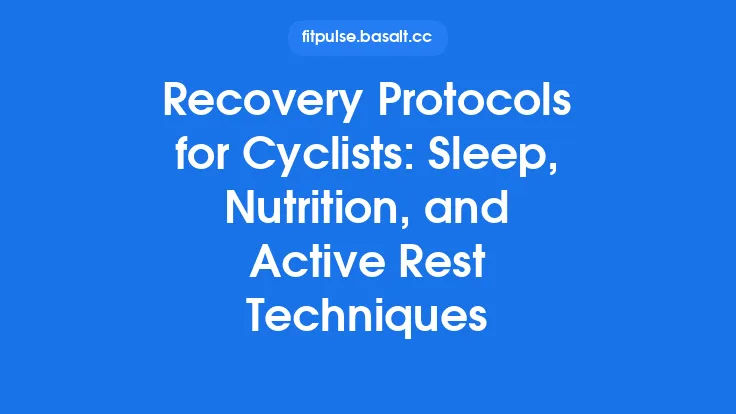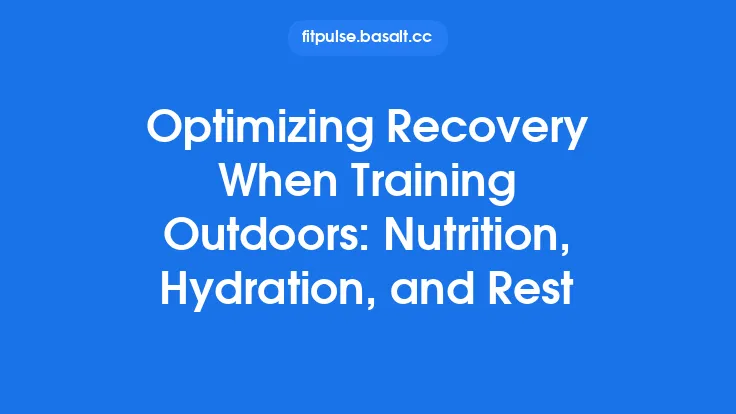Marathon training places extraordinary demands on the body, and the food you eat becomes a critical tool for both performance and recovery. While mileage, pacing, and strength work shape the mechanical side of running, nutrition supplies the fuel, repairs the tissues, and maintains the physiological balance that allows you to sustain weeks of high‑volume training and still cross the finish line strong. Below is a comprehensive guide to the nutritional principles that underpin successful marathon preparation and post‑race recovery.
Understanding Energy Requirements: Calories, Carbohydrates, and Fat
Total Daily Energy Expenditure (TDEE) for Marathoners
During marathon training, most runners experience a 15‑30 % increase in total daily energy expenditure compared with a sedentary lifestyle. TDEE is the sum of:
- Basal Metabolic Rate (BMR) – calories needed for basic physiological functions.
- Thermic Effect of Food (TEF) – energy used to digest, absorb, and store nutrients (≈10 % of intake).
- Exercise Energy Expenditure (EEE) – calories burned during runs, strength sessions, and everyday activities.
A practical way to estimate training calories is to start with a BMR calculator (e.g., Mifflin‑St Jeor) and then add:
- Low‑intensity long runs (≤ 60 min): ~ 7–9 kcal/kg body weight per hour.
- High‑intensity intervals or tempo runs: ~ 10–12 kcal/kg per hour.
- Strength or cross‑training sessions: ~ 5–7 kcal/kg per hour.
Carbohydrate: The Primary Fuel for Endurance
Carbohydrate stores in muscle (glycogen) and liver are the most readily oxidized energy source during prolonged running. The following guidelines help ensure glycogen availability:
| Training Intensity | Daily Carb Intake (g/kg BW) |
|---|---|
| Easy runs (< 60 % VO₂max) | 4–5 |
| Moderate mileage (≈ 1 h runs) | 5–7 |
| High‑volume weeks (> 80 km) or intense sessions | 7–10 |
| Taper week (reduced volume) | 5–6 |
For a 70 kg runner, a high‑volume week may require 490–700 g of carbohydrate per day, translating to roughly 2,000–2,800 kcal from carbs alone.
Fat: The Endurance “Backup” Fuel
While carbs dominate at marathon pace, fat oxidation becomes increasingly important during long, low‑intensity runs and the later stages of a race when glycogen stores dwindle. Aim for:
- 30–35 % of total calories from healthy fats during moderate training weeks.
- Emphasize monounsaturated (olive oil, avocado) and polyunsaturated (nuts, fatty fish) fats, limiting saturated fats to < 10 % of total calories.
Micronutrients: The Unsung Heroes
Iron
Endurance athletes are prone to iron deficiency due to increased losses through sweat, gastrointestinal micro‑bleeding, and hemolysis. Low iron impairs oxygen transport and reduces VO₂max.
- Recommended Dietary Allowance (RDA): 18 mg/day (women), 8 mg/day (men).
- Food sources: Lean red meat, poultry, fortified cereals, lentils, spinach (paired with vitamin C for better absorption).
- Testing: Serum ferritin should be > 30 µg/L; consider periodic blood work during heavy training blocks.
Calcium & Vitamin D
Bone health is critical for high‑impact runners. Adequate calcium (1,000–1,200 mg/day) and vitamin D (800–1,000 IU/day) support remodeling and reduce stress‑fracture risk.
- Calcium sources: Dairy, fortified plant milks, tofu, almonds.
- Vitamin D sources: Sun exposure, fatty fish, fortified foods; supplementation may be needed in higher latitudes.
Electrolytes (Sodium, Potassium, Magnesium, Chloride)
Electrolyte balance governs fluid retention, nerve conduction, and muscle contractility. Sodium is the most crucial during long runs because it is the primary driver of thirst and fluid retention.
- Sodium intake during runs > 90 min: 300–600 mg per hour.
- Potassium: 4,700 mg/day from fruits, vegetables, legumes.
- Magnesium: 310–420 mg/day; important for energy production and muscle relaxation.
Timing Matters: Pre‑, During‑, and Post‑Run Nutrition
Pre‑Run Meal (2–3 hours before)
- Carbohydrate focus: 1–4 g/kg body weight, low in fiber and fat to minimize gastrointestinal distress.
- Example: 70 kg runner → 70–280 g carbs → a bowl of oatmeal with banana, honey, and a small scoop of whey protein.
- Hydration: 500–600 ml of water or a low‑calorie electrolyte drink.
During‑Run Fueling (≥ 60 minutes)
- Carbohydrate delivery: 30–60 g per hour, preferably in a 2:1 glucose‑fructose ratio to maximize absorption via multiple intestinal transporters.
- Form: Gels, chews, sports drinks, or diluted fruit juices.
- Sodium: 300–600 mg per hour, integrated into the fueling product or taken as salty snacks (e.g., pretzels).
- Fluid volume: 150–250 ml per hour, adjusted for temperature, humidity, and sweat rate.
Post‑Run Recovery (within 30 minutes)
- Carbohydrate‑protein blend: 1:0.3–0.4 ratio (e.g., 1 g carbs + 0.3 g protein per kg body weight). This stimulates glycogen resynthesis and muscle protein synthesis.
- Example: 70 kg runner → 70 g carbs + 21 g protein → chocolate milk, a recovery shake, or a turkey sandwich with fruit.
- Rehydration: Replace 150 % of fluid lost (weigh yourself pre‑ and post‑run). Include electrolytes, especially sodium, to restore plasma volume.
The Role of Gut Training
Repeated exposure to carbohydrate during long runs trains the gastrointestinal tract to absorb and tolerate higher carbohydrate loads, reducing the risk of cramping or “bonking.” A systematic approach:
- Start with 30 g/h during weekly long runs.
- Increase by 5–10 g/h every 1–2 weeks, monitoring tolerance.
- Vary carbohydrate sources (glucose, fructose, maltodextrin) to engage multiple transporters.
- Practice the exact race‑day fueling (same brands, timing, and fluid temperature) during at least two long runs.
Supplementation: Evidence‑Based Options
While a well‑balanced diet should cover most needs, certain supplements have demonstrated benefits for marathoners when used appropriately.
| Supplement | Primary Benefit | Typical Dose | Evidence Summary |
|---|---|---|---|
| Caffeine | Improves perceived effort, increases fatty‑acid oxidation | 3–6 mg/kg body weight ~ 30–60 min before race | Consistently shown to enhance endurance performance; avoid > 9 mg/kg to limit side effects. |
| Beta‑Alanine | Buffers intramuscular acidity, may delay fatigue in high‑intensity intervals | 2–5 g/day (split doses) for ≥ 4 weeks | Benefits more pronounced in events with repeated surges; modest effect for steady marathon pace. |
| Sodium Bicarbonate | Extracellular buffer, useful for short, high‑intensity efforts | 0.2–0.3 g/kg body weight 60 min pre‑exercise | Can cause GI upset; not typically needed for marathon pacing. |
| Vitamin C & E | Antioxidant protection, may aid recovery | 500–1,000 mg (C), 400 IU (E) daily | High doses may blunt training adaptations; moderate intake through food is preferred. |
| Probiotics | Supports gut health, may reduce GI distress during long runs | Strain‑specific; 1–10 billion CFU daily | Emerging evidence; choose clinically studied strains for athletes. |
| Iron (if deficient) | Restores hemoglobin, improves oxygen transport | 30–60 mg elemental iron daily, with vitamin C | Only supplement if labs confirm deficiency; excess iron can be harmful. |
Hydration Strategies Across Training Phases
Baseline Hydration
- Daily fluid target: 35 ml/kg body weight (≈ 2.5 L for a 70 kg athlete) from all sources (water, food, beverages).
- Urine color: Light straw indicates adequate hydration; dark amber suggests need for more fluid.
Pre‑Race Hydration
- Night before: 500 ml of water or an electrolyte drink before bedtime.
- Morning of race: 250–500 ml 2 hours before start, followed by 150–250 ml 15 minutes prior.
During the Race
- Rule of thumb: 150–250 ml per 20 minutes, adjusted for temperature and sweat rate.
- Sweat rate testing: Weigh yourself nude before and after a 1‑hour run; the weight loss (kg) × 1,000 = ml of fluid lost. Replace 150 % of that amount.
Recovery Nutrition Beyond the Immediate Window
The “Anabolic Window” Myth
Recent research shows that muscle protein synthesis remains elevated for up to 24 hours post‑exercise, provided total daily protein intake meets targets. Therefore, while the first 30 minutes are convenient, the overall daily protein distribution matters more.
Protein Distribution
- Goal: 1.6–2.2 g/kg body weight per day for endurance athletes.
- Meal pattern: 20–30 g of high‑quality protein every 3–4 hours (e.g., whey, soy, dairy, eggs, lean meat, legumes).
- Evening meal: Include casein or a mixed‑protein source to sustain amino acid delivery overnight.
Anti‑Inflammatory Foods
Chronic low‑grade inflammation can impair recovery. Incorporate:
- Omega‑3 fatty acids: 1–2 g EPA/DHA per day (fatty fish, algae supplements).
- Polyphenol‑rich foods: Berries, tart cherry juice, green tea.
- Curcumin (with black pepper): 500 mg daily may reduce post‑exercise soreness.
Practical Meal Planning for Marathon Training Cycles
| Phase | Sample Daily Menu (≈ 2,800 kcal) |
|---|---|
| Base (low mileage) | Breakfast: Greek yogurt + granola + berries (60 g carbs, 20 g protein) <br> Snack: Banana + almond butter (30 g carbs) <br> Lunch: Quinoa bowl with grilled chicken, roasted veg, olive oil (80 g carbs, 30 g protein) <br> Afternoon Snack: Hummus + whole‑grain pita (35 g carbs, 8 g protein) <br> Dinner: Baked salmon, sweet potato, steamed broccoli (70 g carbs, 35 g protein) <br> Evening Snack: Cottage cheese + pineapple (15 g carbs, 15 g protein) |
| Peak (high mileage) | Breakfast: Oatmeal with honey, raisins, whey protein (100 g carbs, 30 g protein) <br> Mid‑morning: Sports drink + gel (60 g carbs) <br> Lunch: Whole‑grain pasta with lean turkey meat sauce, side salad (120 g carbs, 35 g protein) <br> Afternoon: Chocolate milk (45 g carbs, 10 g protein) <br> Pre‑run snack (30 min before long run): Rice cake + jam (30 g carbs) <br> Post‑run: Recovery shake (60 g carbs, 20 g protein) + banana <br> Dinner: Stir‑fry with brown rice, tofu, mixed veg, soy sauce (90 g carbs, 25 g protein) <br> Evening: Greek yogurt with honey (20 g carbs, 15 g protein) |
| Taper (reduced volume) | Breakfast: Whole‑grain toast, avocado, poached eggs (45 g carbs, 20 g protein) <br> Snack: Apple + cheese slice (20 g carbs, 7 g protein) <br> Lunch: Lentil soup, side of whole‑grain roll (70 g carbs, 25 g protein) <br> Afternoon: Smoothie (spinach, mango, whey) (40 g carbs, 20 g protein) <br> Dinner: Grilled chicken, quinoa pilaf, roasted carrots (80 g carbs, 35 g protein) <br> Evening: Warm milk with turmeric (10 g carbs, 8 g protein) |
*Adjust portion sizes to match individual caloric needs and body weight.*
Monitoring and Adjusting Your Nutrition Plan
- Track intake: Use a food‑logging app (MyFitnessPal, Cronometer) for at least two weeks each training block.
- Assess performance markers: Notice any “hitting the wall,” excessive fatigue, or prolonged soreness—these may signal inadequate carbohydrate or protein.
- Body composition checks: Weigh‑in weekly; a loss > 0.5 kg per week during high‑volume phases may indicate a caloric deficit.
- Blood work: Periodically test ferritin, vitamin D, and electrolyte status, especially after long training blocks or during the off‑season.
- Gut tolerance trials: Introduce new fueling products during easy runs, not on race day.
Summary of Key Takeaways
- Carbohydrate is king for marathon training; aim for 5–10 g/kg body weight per day depending on volume and intensity.
- Protein should be distributed evenly (20–30 g per meal) to support repair and adaptation, targeting 1.6–2.2 g/kg body weight daily.
- Fat supplies a steady energy source; keep it at 30–35 % of total calories, focusing on unsaturated varieties.
- Micronutrients—especially iron, calcium, vitamin D, and electrolytes—are essential for oxygen transport, bone health, and fluid balance.
- Timing matters: pre‑run carbs 2–3 h before, 30–60 g/h carbs (with sodium) during runs > 60 min, and a 1:0.3 carb‑protein blend within 30 min post‑run.
- Gut training and personalized hydration prevent gastrointestinal distress and maintain plasma volume.
- Evidence‑based supplements (caffeine, beta‑alanine, targeted electrolytes) can provide marginal gains when used correctly.
- Regular monitoring—through food logs, body weight, and blood tests—ensures the plan stays aligned with training demands.
By integrating these nutrition fundamentals into every phase of marathon preparation—base building, peak mileage, taper, and race day—you create a metabolic environment that maximizes energy availability, accelerates recovery, and ultimately translates into stronger, more consistent performances on the road.





